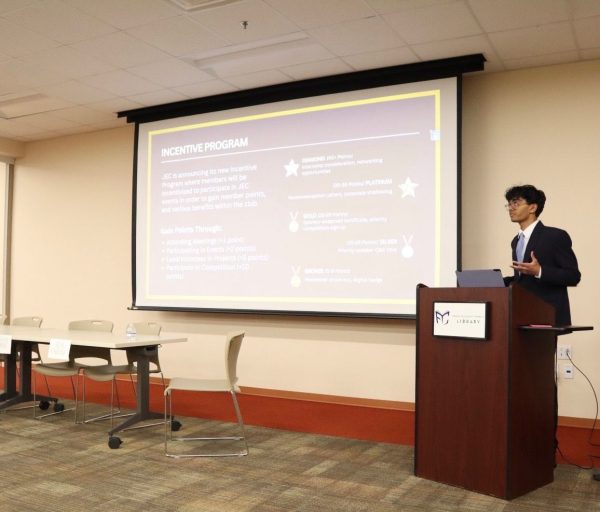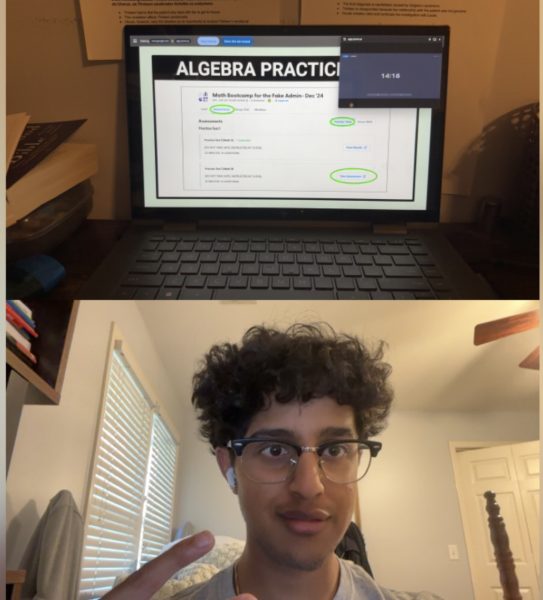Why Generation Z needs more Z’s and less stress
Senior Jessica Borla takes a quick break as the finish line of the school year draws nearer. Caught up in the race of getting ahead for college admissions, students often have to sacrifice sleep and socializing, causing the school hours to become a struggle to stay awake.
For years, teenagers have been depicted as the laziest, most apathetic cohort of society, easy punch lines for any stand-up comedian’s routine. Watch any teen movie from the 90’s or early 2000’s, and you’ll no doubt observe the “lazy teenager” trope in all its exaggerated glory. Exasperated parents flick on bright lights and literally yank their good-for-nothing children out of bed, all the while cursing their lethargic ways. While many teens do exhibit these bad habits, I believe in today’s world, this idea that teenagers are lazy is complete and total bunk. Nowadays, teens work harder than ever at school, overloading their schedules to gain credentials seen as necessary to get into a good college. Today’s generation of teenagers, known as Generation Z, often times gives more effort than is healthy, and all at the high price of less sleep. Teens need to be given more credit in society; we’re definitely not lazy anymore… we just need a break!
It’s time to put into practice what science has already proven
By now, it’s common knowledge that teenagers need more sleep than adults– studies show about nine to nine and a half hours of sleep a night- and tend to fall asleep later to a shift in their biological clocks. These are proven facts that have been known for years and yet, the problem of teen’s not getting enough sleep is only getting worse and worse. The students of Lambert appear to have significant problems with stress and sleeplessness, and it’s not hard to see why, as we attend one of the most competitive high schools in Georgia. In a survey of 90 Lambert students, 78% reported getting less than 7 hours of sleep a night. Only 5 of the participants reported getting more than 8 hours. Many students commented through the survey, expressing strong opinions on their insane daily schedules and their resulting anxiety and exhaustion. A sophomore student provided her opinion, saying, “My class schedule this year isn’t hard but combined with sports and social activities and lack of sleep, stress is a frequent thing in my and pretty much all of my friend’s lives.”
The heart of the issue that is the dismal state of teenagers’ sleeping schedules is that their daily schedules are jam packed with homework from tough AP classes and extracurricular activities like sports teams, clubs, and jobs. 81% of students surveyed reported taking anywhere from 1 to more than 3 AP classes, and 57% reported having more than 2 hours of homework a night. For many students, their challenging AP workload sometimes must take a back seat to jobs or sports obligations, or vice versa. Students are working overtime these days, many not getting into bed before midnight. For senior Truc Vu, getting to sleep by midnight means it was a good day. “I’m usually doing homework, or just procrastinating,” she admitted. “Last year was even worse; I usually went to bed at 2 or 2:30.”
Nine hours of sleep a night is not just a recommendation for teenagers: it’s what they need to function as cognizant, active, and contributing members of society. Not getting this critical amount of sleep leads to lethargy, less attention to detail, weight gain, and even depression. But with the pressure of grueling daily schedules, finding the right balance of involvement in school and extracurriculars and getting enough sleep is a catch-22. It’s like how surgeons and soldiers need more sleep due to the strenuous and mentally exhausting nature of their work, but often get very little for the same reason; they’re constantly on the front lines with no time for rest. Teenagers need more sleep to fuel their growing brains and rejuvenate from daily stress, but can’t get enough because of how involved and active they are.

Students react
Many students anonymously expressed their opinions on the high expectations placed on teenagers, and a similar theme ran through their comments: the fact that something has to give, or teens will crack under the pressure.
Question: Are you stressed out by your daily schedule?
“Six APs for anybody can be at least somewhat stressful. I guess, for me, since I am surrounded by people who take anywhere from 5-7 APs, it doesn’t seem that terrible. My stress really dropped after first semester of senior year though. After that point, grades don’t matter that much anymore.”- A senior
“I just want to sleep when I get home from working out so I don’t do my homework.”- A Junior
“I recently missed about a week of school because my doctor found something was wrong with me. After seeing between 6 and 7 specialists (and thinking I had something terrible like cancer), we found out I just had severe anxiety because of school and other school activities.”- A sophomore
“I dread coming to school every day because I’m tired and don’t want have to take on any more assignments than I already have to do. I dread going home after practice because I don’t want to do homework. I basically dread everything in my life except weekends where I get to sleep.”- A Junior
“Everything is so much so often.”- A Junior
Question: Are expectations placed on teenagers too high?
“In my community, oh heck yeah. Identity is defined by how much you do and by how prestigious the stuff you’re doing sounds. If somebody doesn’t seem busy, he or she may be judged as “lazy” or “uninvolved”. Which may be true, but not always. College admissions may be responsible in some way for this, since involvement is one way they measure students.”- A Senior
“Getting into college has become so competitive that students are pressured to take an extreme number of AP classes to compete with their peers. I am only a sophomore and not taking that many AP classes this year, but next year I will be taking 6 and I know of many people that will be taking 7. To get into the really competitive colleges, taking that many AP classes is almost necessary, but you also have to have extracurriculars.”- A Sophomore
“There’s this fear among students that if they don’t take a million APs (and do a ton of sports, clubs, extracurriculars, and volunteering), they won’t be good enough to get in to college or do well in life. The truth is, Lambert is an exceptional school that wants nothing but the best, so a “mediocre” job here is actually well above national average. Believe me, if you go to Lambert and you at least try to get decent grades, you’re going to get into a college. You’ll be fine.”- A Senior
“I want to be an artist. All of my friends want to be doctors. Because of the stress of taking AP classes, I feel like I should also be a doctor. Therefore I’m trying to take classes that I completely regret taking. I have average/low grades in these classes because of my stress. If this doesn’t improve I could easily develop anxiety (honestly I probably have it now). Something seriously needs to be done about this because it is affecting everyone.”- A Sophomore
The teens have spoken: Something’s got to give
Based on these testimonies from students of all grades, it’s obvious that the students of Lambert are stretched to their limits every day. And this daily stress can have long-lasting impacts on the health of teenagers, like imbuing them with anxiety disorders and extremely negative self-image. So the question remains, what can be done about this massive problem? Why does it seem that with all of the cries for help from kids who feel like they’re in a never-ending spiral of stress, the system remains as it always has been? Some of these issues stem from biological changes in teens, and for many, poor study habits and time management skills. But I believe that most of these problems that teens are experiencing with intense stress and sleep deprivation all stem from the fact that the first eighteen years of the lives of many American children are spent preparing for getting into a good college.
Many middle to upper class families now view childhood as a time to get ahead of the game in terms of academics, and as a result, students enter high school with the mentality that they’re in for four years of planning for college. The solution to this issue lies in universities and colleges taking the initiative to change the admissions process. Initiatives such as “Turning the Tide”, a report by the Harvard University Graduate School of Education, provide a large step in the right direction. The report was created by a coalition of admissions officers and administrators from colleges across the country, and it advocates a revolution in the admissions process. It highlights three main goals for colleges: emphasizing meaningful community service involvement over participation in many community activities merely to pad a college resume, assessing service contributions based on a variety of family and community situations, and redefining achievement in a way that eases “excessive achievement pressure.” The report recommends that colleges place less emphasis on standardized test scores, number of AP classes, and number of extracurricular activities. Many colleges have applied a test-optional policy to their admissions process, and if others followed suit, students could find themselves relieved of anxiety and pressure. Teens could apply equal amounts of focus to schoolwork and other important aspects of life, such as socializing, learning how to be a good person, and gaining valuable life skills. Not to mention, they could devote more hours to getting some shut-eye.
But what if I’m stressed now?
Until these reforms are implemented, teens will only face the same problems and spiral of stress. While the system may take time to change, there are ways of coping with stress that students can, and should, take advantage of today. First, it’s important to note that, like the anonymous student commented above, for students that think they’re not working hard enough or devoting enough hours to school work or activities, most likely, they are absolutely fine and will have no problem getting into a good college. Lambert is an incredibly competitive high school and sometimes the pressure placed on students here to succeed warps their view of what is an acceptable level of achievement. Another thing to keep in mind is that at the end of the day, grades, standardized test scores, and honor society cords are not the most important thing in life. What should matter most to colleges is that students are healthy, happy, caring and empathetic members of society.
If any students are feeling overwhelmed, anxious, or depressed, it’s important that they reach out to a parent, teacher, or other trusted adult to help them work through any issues. There are always counselors at school that can assist students, and even the therapy dogs that visit the media center are incredibly helpful in easing daily stresses and anxieties. The easiest way to feel less stressed is to prioritize sleep more often. If your GPA and test scores are what will get you into college, a good night’s sleep can help you conquer the world.
Your donation will help support The Lambert Post, Lambert High Schools student-run newspaper! Your contribution will allow us to purchase equipment and cover website hosting costs.








